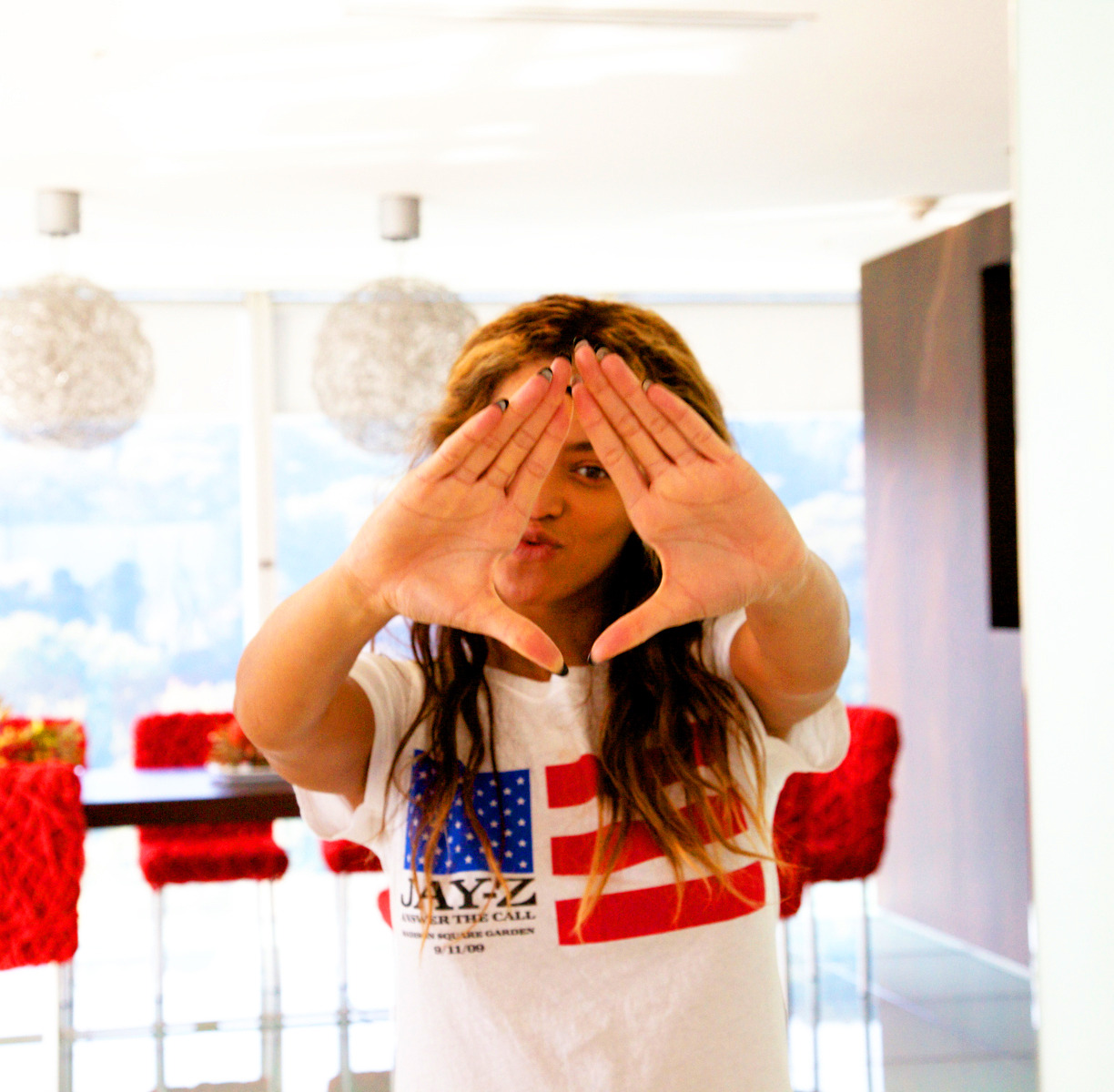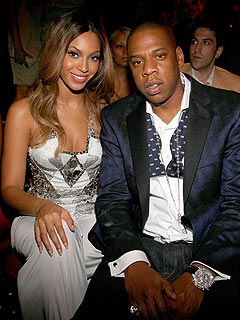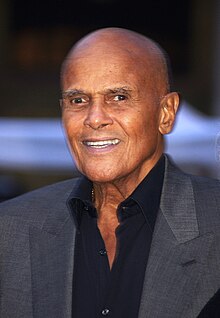"They have not told the history of our people, nothing of who we are," Belafonte said. "We are still looking. We are not driven by some technology that says you can kill Afghans, the Iraqis or the Spanish. It is all - excuse my French - s**t. And I think one of the great abuses of this modern time is that we should have had such high-profile artists, powerful celebrities. But they have turned their back on social responsibility. That goes for Jay-Z and Beyonce, for example."
Of course the media took this quip and ran with it motivating Beyonce's camp to fire back and prove him wrong. Michael Arceneux also came to Bey-Z's defense with an op-ed in Ebony arguing that, "Belafonte Misses the Mark." In Arceneux's opinion being "'socially responsible' is subjective" and "Beyonce is doing her part her way."
While I agree with Mr. Arceneux, I'm going to take it one step further and say, it's OK Bey-Z. You don't have to prove or do anything socially responsible. We love you and appreciate you when you do, but it's not in your job description.
Yup. I SAID IT. Hear me out.
Harry Belafonte - the singer, actor, sex symbol and activist - came to fame in the 50s and 60s, one of the most politically charged era's in modern American history. It was a show of political activism for him to even pursue his career in the entertainment industry, let alone demand equal rights along the way. Thank you Mr. Belafonte for your work as an activist because we now live in the era that is the fruit of your labor. Belafonte and many other prominent blacks during that time struggled so that we too can have a piece of the American dream. And guess what? Their efforts paid off. Exhibit A: Bey-Z.
 Belafonte
is right. It is absolutely a shame that the power couple does not use
their money, power and privilege for more social good, but that's about
all he's right about. When Beyonce was singing in Girls Tyme
rehearsing in her parent's suburban Texas home, she wasn't dreaming of
world peace and humming MJ's "Heal the World." She was working on being a
starrr at whatever costs, and Mama & Papa Knowles made it
happen. Meanwhile, hubby Jay-Z has never hidden the fact that his first
financial success was as a dope dealer on the backs of those with a bad
habit. As the lyrics of one his most popular raps state, "Even back then
you can call me/ CEO of the R-O-C," and he has no qualms letting you
know that he's "not a businessman/ [he's] a business, man."
Belafonte
is right. It is absolutely a shame that the power couple does not use
their money, power and privilege for more social good, but that's about
all he's right about. When Beyonce was singing in Girls Tyme
rehearsing in her parent's suburban Texas home, she wasn't dreaming of
world peace and humming MJ's "Heal the World." She was working on being a
starrr at whatever costs, and Mama & Papa Knowles made it
happen. Meanwhile, hubby Jay-Z has never hidden the fact that his first
financial success was as a dope dealer on the backs of those with a bad
habit. As the lyrics of one his most popular raps state, "Even back then
you can call me/ CEO of the R-O-C," and he has no qualms letting you
know that he's "not a businessman/ [he's] a business, man." Bey-Z collectively have built an empire of wealth in true American fashion;
they pulled themselves up by their own bootstraps, and are only looking
out for themselves and their own - which does not include all of black
America, or all of poor America, or all of underprivileged America, or
any of those groups overseas either. They invest in themselves to make
sure the family business stays strong, and cater to their adoring fans
just enough to keep the dough rolling in. Charitable giving is for tax
write-offs and photo ops, and that my friends is how American capitalism
(aka the American dream) works.
Bey-Z collectively have built an empire of wealth in true American fashion;
they pulled themselves up by their own bootstraps, and are only looking
out for themselves and their own - which does not include all of black
America, or all of poor America, or all of underprivileged America, or
any of those groups overseas either. They invest in themselves to make
sure the family business stays strong, and cater to their adoring fans
just enough to keep the dough rolling in. Charitable giving is for tax
write-offs and photo ops, and that my friends is how American capitalism
(aka the American dream) works. Often times, activism is motivated by living through unjust experiences. Belafonte was of the era of entertainers who still had to use the back door in certain performance venues, even if he was the headlining entertainment. I'd boycott performing across southern state lines too, if that would be my experience. Yet, that's not the Bey-Z experience at all. As much as older generations of African-American's would like for the "we as a people"-rhetoric to persist (we, meaning all black people who are victims of our collective American race problem), WE brown-skinned folks in 2012 have vastly different experiences. The class spectrum is much wider, and though each of our individual experiences is certainly tainted by racism, we don't live in a world anymore where all black people are going to jump on the same bandwagon just because we don't pass the paper bag test.
Maybe Belafonte thinks that Bey-Z owes it to the generations before who made it possible for them to be where they are. Or don't they at least owe it to their bajillion international fans to be more socially responsible? I certainly think they do, and gee wouldn't that be a nice gesture? But you know what else is a very American trait, especially of the 1%? Selfishness. Thinking that you did it all by yourself, and having no problem stepping on the backs of others to get where you want to be (i.e. Girls Tyme --> Destiny's Child --> DC3--> Beyonce). Yes it would be nice if they actually got down and dirty to promote the well-being of the 99%, but it's not in their job description, and definitely not in the "how-to" book on building your empire. Even if "green," "fair trade," and "sustainable" business practices are today's trend with a heavy emphasis on charitable giving, most wealthy Americans are not green or extremely charitable at all. Sad, but true.
Contrary to Mr. Belafonte's statement, Bey-Z have indeed told the history of our people, and who we are. We are a people who have varying levels of privilege and opportunity afforded to us. Who, with those varying levels of privilege, may work to achieve 1% status, barring all perceived moral and social obligations. We also recognize Bey-Z as the exception, and not the rule. Perhaps it is the lot for us with a social conscience to never achieve their level. Still, we know that black folk exist at every facet on the spectrum in between. Black Americans are an American people before anything else, and for all the ugly truth about our nation's character, it is why our country's president - and no other - gets to be called the Leader of the Free World.
With all that said, that American Bey-Z hustle is pretty damn serious. They have been successful at achieving the dream on the backs of Mr. Belafonte, you and me. No it's not right, but by all American standards, it's okay.
 |
| Living the dream. |


2 comments:
Either this person is just too young or doesn't quite understand how strong the Black Culture's commitment toward community and values.
Nevertheless, the blog is woefully inadequate when addressing the need for Leaders to emerge among the newest generation of Black Entertainers and Artists..
We are a Culture, not just a Race.
Hi Shaw - If you are referring to the author, me, in your comment, I'll take a minute to respond. I have an extremely strong grasp of the African-American culture's historical commitment and trend toward community and values; however, we live in a much different time than our parents or grandparents' generations. Black Culture is not monolithic - there is not just ONE black American experience. Class and globalization among other factors contribute to this.
The bottom line is that leaders and social issue-based activists are a lot more likely to emerge out of groups with similar economic backgrounds, than based purely on race. Further, it is wrong to assume that it is the responsibility of black entertainers and artists to address our social ills. They may do so, as they see fit, but it is far more fruitful and impactful for us to become leaders in our own right, within our own individual communities, than to wait on a Beyonce or Jay-Z to lead the way.
Post a Comment